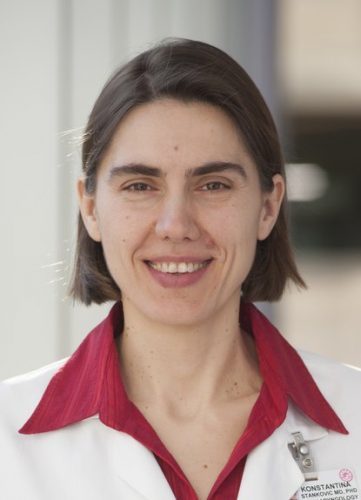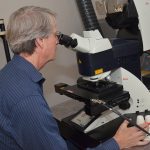Preliminary findings from Konstantina M. Stankovic, MD, PhD, director of the Division of Otology and Neurotology at Mass Eye and Ear, and Albert Edge, PhD, Principal Investigator, Eaton-Peabody Laboratories, may pave the way for trials to test bone density medications for hearing loss.
Hearing loss caused by damaged nerves, whether from sound exposure or aging, is irreversible. There are currently no medications approved by the Food and Drug Administration (FDA) to treat and reverse the most common type of hearing loss, called sensorineural hearing loss (SNHL). But, a new animal study hopes to pave the way for future trials to see whether this type of treatment can be used in people.
New research led by Dr. Stankovic and Dr. Edge has found medications called bisphosphonates, which are commonly used to prevent bone density loss, were able to regrow damaged nerve connections in the inner ear in mice with SNHL. While the findings require further studying in animal models, the research team hope it could be a promising target for conducting clinical trials in people with SNHL.

The discoveries were published July 14 in Frontiers in Molecular Neuroscience.
“This is a significant finding because it opens the possibility for repurposing bisphosphonates, which typically treat severe osteoporosis and metastatic bone disease, for the treatment of sensorineural hearing loss,” said Dr. Stankovic. “We hope the promising results from this pilot study can lead to clinical trials within the next several years.”
Sensorineural hearing loss caused by damaged nerves
Disabling hearing loss affects 466 million people worldwide and 56 million in the United States — numbers that are expected to more than double over the next two decades. Hearing loss can take a toll on health and well-being, and untreated hearing loss costs more than $750 billion in health care spending each year worldwide, due to more hospital stays and greater need for emergency rooms and clinical visits.
For typical hearing, sound waves travel through the ear canal before reaching the eardrum and the tiny bones of the middle ear. They are then converted into electrical signals in the inner ear and transmitted to the brain via the auditory nerve.
One type of hearing loss, called conductive hearing loss, occurs when sound transmission from the ear canal to the inner ear is impaired (such as by a middle ear infection, fluid, or impaired vibration of middle ear bones), leading to a reduction in sound levels reaching the inner ear and an inability to hear soft sounds.
Sensorineural hearing loss, on the other hand, occurs in the inner ear. The most common causes of hearing loss are noise exposure and aging, which results in loss of connections, called synapses, between nerve cells and sensory hair cells found in the inner ear. This type of SNHL is referred to as cochlear synaptopathy.
Early findings fuel future research hopes
Previous research from Dr. Stankovic’s lab looked to target pathways to treat SNHL. Their analyses found that osteoprotegerin, a substance typically secreted by bone cells to inhibit bone remodeling, is highly produced by cochlear neurons and promotes their survival. In previous studies, doctors have observed that people with SNHL due to severe otosclerosis who take bisphosphonates have the ability to significantly improve their hearing loss and understand speech.

Word recognition is a sensitive measure of cochlear nerve function. That revelation, along with the previous results from the influence of the drug on the rapid increase and survival of cochlear stem cells, prompted the researchers’ new study to determine the effects of bisphosphonates on cochlear synaptopathy.
The scientists administered bisphosphonates to mice 24 hours after noise exposure. They found that the medication had a dramatic effect at regenerating the synapses between inner hair cells and spiral ganglion neurons found in the ear, and restoring cochlear function.
The team further suggested that their finding provides possible mechanisms for why some patients in the clinic have improved their ability to recognize speech after bisphosphonate treatment. They also suggest that bisphosphonates are worth considering to reverse the loss of nerve connections for the treatment of human SNHL.
Dr. Stankovic cautioned that the study is still early. More research is needed, in animals and then in clinical safety and efficacy trials, before this could be a recommended treatment.
“It is our hope that, with further study, we can offer patients who have currently irreversible hearing damage a medication that might stall or reverse their hearing loss,” she said.
For more information:
Regeneration of Cochlear Synapses by Systemic Administration of a Bisphosphonate


I have 100% hearing loss in my left ear since I was 18 months old. We believe it was from an ear infection which caused neck swelling and excruciating pain. The ear doctor said is was the cochlea that is damaged. Is your team doing human trials. Thanks, C Geiger
Hi Carol, thanks for reading and your comment. There are no human trials yet for this bisphosphonate study, that is the team’s hope in the future). If you’re interested in learning more about ongoing treatment options/trials from a Mass Eye and Ear hearing specialist, you can call 617-573-3972 for an appointment or visit this website for more information on our specialists. https://www.masseyeandear.org/specialties/hearing-and-balance
Appreciate the update on your research. I experienced sudden sensorineural hearing loss in one ear (what was my good ear!) five years ago before being diagnosed with Meniere’s disease. Is there any indication that the research being done might have some crossover applications to those with Meniere’s? Thanks again for posting your research update.
Hi Robert, thanks for reading. This research is in early stages and not yet in clinical trials in people, but be sure to follow our blog Focus as we’ll continue to update on our progress on the studies.
I recently have a sudden and a complete hearing loss in my right ear. It was diagnosed by my local ENT doctor, as well as in Mass General ENT. The cause was unknown. I would like to voluntarily participate in any trial offered by you. Please let me know and I am ready at any time.
Thanks
Thanks for reading and your comment, Ganesh. We are sorry to hear what you’ve been going through. This study is not yet in clinical trials, but continue to follow our blog, Focus, for updates and we’ll let our readers know when trials are underway.
I had a sudden deafness beginning of this year and become middel to severe SNHL. I now have to use hearing aids. Even with hearing aids I stil have difficulties from time to time, especailly in meetings or noisy background. I read the report. I have started trying the bisphosphonates, I guess it does not hurt. What if it works? I had the first injection today, and will do it once a month. I will keep you posted.
I have age related hearing loss. I would love to try a medication that would help restore my loss.
That’s great news about the findings.
I do wonder if those statistics are correct…56 million people in the US have disabling hearing loss? That’s roughly 1 of 7 Americans. I have almost 100% hearing loss in one ear due to SNHL. Until it happened to me I’d never even heard of sudden hearing loss, much less even knew a single person with disabling hearing.
Hello, I have experienced hearing loss in the last year and am Very interested to know if you have taken any steps to organize a clinical trial of some sort regarding treatment with bisphosphonates. Has anything happened since your article was published last July?? Thanks!
Hi Ian, thanks for reading and for your comment. We don’t have any updates yet but will be sure to update our story and readers when we finally do.
I experience intermittent hearing loss in both ears. The drs I have visited to date are at a loss for what could be the cause of this. Periods with bad hearing can last several weeks followed by periods of fairly good hearing lasting again another couple of weeks. I would like informative on drs within Mass Eye and Ear that I can schedule a consultation with next summer. Dennis Ledbetter
Hi Dennis, you can contact our hearing loss MDs at 617-573-3954 for a consultation. Here’s more info: https://www.masseyeandear.org/specialties/hearing-and-balance
My ENT thinks I have SNHL. I am currently taking oral steroids and getting weekly steroid injections in to the affected ear (over a 3 week period.) Could I get a link to the blog? I’d love to get updates on advances in research being done to reverse hearing loss. Thank you!
Hi Susan, thanks for reading and your comment, you can sign up to receive our blog here. https://focus.masseyeandear.org/subscribe/
Hi, I have a child that experienced sudden hearing loss. My child never had an ear infection until age 12 that was accompanied by ringing. We saw the doctor on 2 occasions that said this was due to fluids and only prescribed an antibiotics. One month later when the ringing and hearing loss persisted, I insisted on seeing a ENT who prescribed steroids. With steroids, about 40% of the hearing was recovered. Hearing in that ear fluctuates. I would be interested in finding out more about this study.
Hi Angela, thanks for reading and sorry to hear what your family has been going through with hearing loss. We’ll be sure to update our blog when we have more information and updates about the research.
Hello
Are you nearing clinical trials yet for senineural hearing loss?
Thank you!